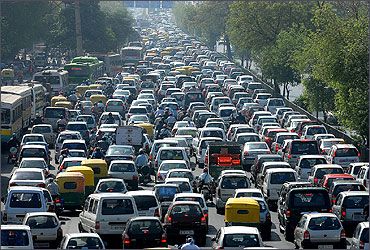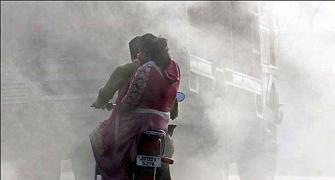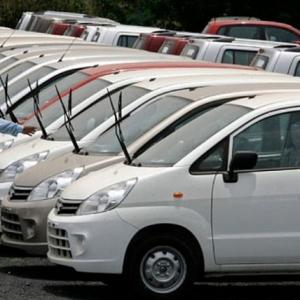Stalling the introduction of better emission standards is based on specious logic, especially in a country that has 13 of the world's most polluted cities, notes A K Bhattacharya.
 Has the Indian automobile industry been allowed to go scot-free as far as its compliance with the best emission standards is concerned?
Has the Indian automobile industry been allowed to go scot-free as far as its compliance with the best emission standards is concerned?
Developments in the last few weeks would suggest that the Indian automobile manufacturers may not have put their best foot forward in this regard.
Automobile industry representatives will of course disagree with such a view and argue that they are being wrongly singled out as the villain in the current debate over vehicular emission that has certainly been one of the factors contributing to the rise in pollution levels in Indian cities to dangerous levels.
A close scrutiny of the current developments to identify who could be at fault will therefore be useful.
First, the facts need to be spelt out. The Bharat Stage IV fuel norms for automobiles are applicable to only a few cities in India at present.
These are norms that are broadly equivalent to the Euro IV norms that were introduced in most developed markets many years ago.
But it is a reflection of the Indian regulatory authorities' indifference to rising vehicular pollution levels and their adverse impact on environment that all the Indian cities will get covered under BS IV norms only by 2017.
Worse, the Euro V norms are already being enforced in many developed countries and in India we are debating if their Indian equivalent, the BS V norms, should be enforced from 2019 or the country could leapfrog directly to the BS VI norms from 2020.
Remember that India has the dubious distinction of having as many as 13 of the world's top polluted cities, led of course by Delhi. And a switchover to BS V norms alone can achieve a two-thirds reduction in pollution levels.
In spite of that, the deadline for achieving that reduction is still five years away, by which time the growth in the number of vehicles on Indian roads would continue to rise to neutralise much of the gains from more stringent emission standards, unless of course there is a simultaneous movement to expand the public transportation networks and encourage their greater use.
So, regulatory lethargy is of course responsible for India's relatively slow adoption of improved fuel emission norms.
But that does not absolve the Indian automobile industry of its responsibility towards making their vehicles more green.
Remember that over the last few years it has been exporting a good number of vehicles to many of those markets where there are vastly superior safety and emission standards in place.
It has no option other than following them while entering those markets.
But when it comes to employing the same standards for the cars it produces for the domestic market - be it safety air bags in low-end cars or more stringent emission norms - the question of how they would jack up the prices of vehicles on the Indian roads start bothering Indian automobile manufacturers.
It is a reflection as much of regulatory failure in enforcing better standards as of the industry's lack of enlightened thinking in improving overall standards of the vehicles they produce even if that would mean higher prices or lower margins or sales.
Consider the following. The Union ministry of petroleum has argued that the oil companies see greater financial and environmental logic in leapfrogging to produce petroleum products compliant with BS VI norms, instead of first upgrading their refineries to BS V standards and then to BS VI norms in two stages.
The cost of that two-stage operation would be more, the incremental gains in pollution reduction would be relatively less and the timeline for achieving the best emission standards would be delayed.
If it is a question of investing an estimated Rs 28,000-30,000 crore (Rs 280-300 billion), then questions of maximising the gains in one stroke do assume greater significance.
If Indian oil refineries can make an investment of that order with limited scope of recovering that cost through higher prices, then why shouldn't the Indian automobile industry too worry less about the additional costs it might incur in making the vehicle engines compliant with improved quality of fuels?
The industry may continue to fight its court battle over the use of diesel, but stalling the introduction of better fuel norms on the ground that it would jack up its costs is specious logic.
If its costs go up, then it can pass on that impact to consumers in the form of higher prices.
But delaying the introduction of improved emission norms is neither good economics nor good politics.
It doesn't even speak well of its corporate social responsibility.










